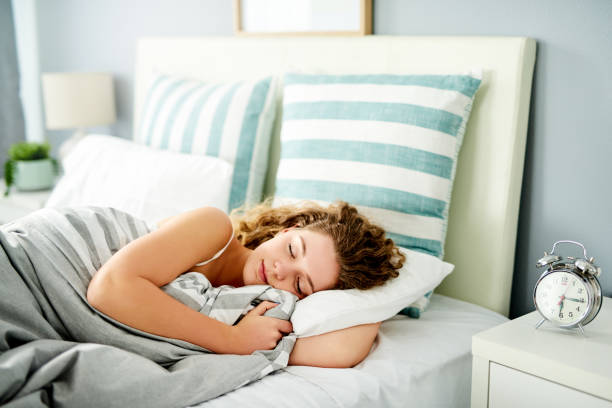Sufficient sleep is vital for the health of humans and animals. If you sleep badly, you will notice negative psychological and physical effects after a short time.

How important is sleep?
Sleeping is part of everyone’s everyday routine. Researchers now know with absolute certainty that good sleep is essential for survival. According to the Robert Koch Institute, getting enough sleep is particularly important for the healthy development of children and young people. The need for sleep decreases with age and can also differ between peers.
Sleep researchers recommend adults get at least 7.5 hours of sleep a day. Children, on the other hand, need significantly more, depending on their age. In the early years, 13 hours or more is common. After that, the number of hours gradually decreases over the years. As a teenager, you should get eight to eleven hours of sleep.
Children and adolescents who sleep little have an increased risk of obesity, which is attributed to the short sleep duration, which can lead to an increased appetite and thus to an increased energy intake. Furthermore, lack of sleep can be associated with a reduced body temperature, which reduces energy requirements. Finally, lack of sleep leads to fatigue, which negatively affects physical activity.
Previously assumed: why do we sleep?
It is generally assumed that sleep is essential for the development and regeneration of nerve cells. Sleep is a necessary process for storing and processing information. It is therefore extremely important to get a good night’s sleep, since sufficient sleep acts like a reset button. The next morning you are fit and rested, so that you can at best go about your tasks fully focused and concentrated.
If you are constantly sleeping too little due to a stressful job, family or other daily burdens, you will find that you are much less concentrated and clumsy. You react slower or make wrong decisions because your brain can’t run at full speed all the time.
Researchers have put forward some hypotheses about why we need sleep:
The brain has a chance to train important neural connections that might otherwise deteriorate due to lack of activity.
Sleep gives the brain the ability to reorganize data to find problem solving, process newly learned information, and organize and archive memories.
Synapses that are no longer required are deleted and cleaned up. Therefore, we wake up feeling refreshed and more optimistic.
The cardiovascular system takes a break during sleep. With enough good sleep, blood pressure can be lowered in the long term.
Growth hormones are increasingly released during deep sleep. The body can repair or replace muscle, tissue, and aging or dead cells during sleep.
New sleep study: research team delivers surprising results
When we sleep at night, the body sleeps but not the mind. At night, the brain is mainly busy processing thoughts and experiences. It sorts out which thoughts are remembered and which are deleted or archived.
Tononi and Cirelli, biologists at the University of Wisconsin-Madison, presented the notion that humans and animals sleep to forget in a New York Times article. They found that synapses are partially cut while we sleep. This is how unimportant memories are lost. On the other hand, we remember more when the neurons in the brain have as many connections as possible. So when a thought or activity is used more often, the connection of the synapses in the brain becomes stronger and stronger. All connections that are only used once or rarely are pushed further and further into the background. We assume that we have this information even if the brain actually never forgets anything.
Now you might think that’s a bad thing, or that it would make us more forgetful. But on the contrary! When the brain automatically deletes all information that is unimportant or superfluous, it creates more capacity for new impressions and thoughts. So if you often have a full head, you should treat yourself to a large portion of sleep to be able to forget unimportant things.
Sleep to forget: Is this why we sleep?
The focus of sleeping is not forgetting, but maintaining our health. This includes the automatic deletion of information in the brain as well as the regeneration of the body. Getting enough sleep is good for your health.
Conversely, not getting enough sleep increases the risk of disease: The results of a recent sleep study by the University of Gothenburg indicate that people who sleep less than six hours a night have a 27 percent higher risk of atherosclerosis, which leads to clogged veins and such heart failure, stroke, or an aneurysm. The study also found that middle-aged men who sleep five hours or less a night are twice as likely to have a heart attack or stroke twenty years later.
Conclusion: Too little sleep is comparable to the effects of smoking or diabetes. There are enough reasons to get enough sleep and rest on a regular basis to keep your body and mind healthy and active in the long term and to sort, process or delete the 60,000 thoughts we think every day.






